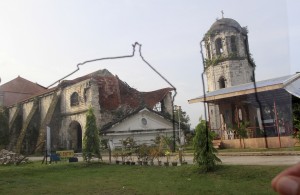
In this October 13, 2014 photo, the Loay church stands after being heavily damaged by the October 15, 2013 earthquake.
On October 15, 2013 at 8:12 am, a 7.5 earthquake shook through the Bohol and Cebu province killing 222 people and destroying thousands of infrastructure. It was the deadliest earthquake in the Philippines in 23 years. Centuries old churches, some built since 1602 by Jesuit missionaries succumbed to the force of the earthquake. INQUIRER/ MARIANNE BERMUDEZ
TAGBILARAN CITY, Bohol — The earthquake drill on Wednesday struck a chord in 11-year-old Marydil Anne Dano.
Dano, a Grade 6 pupil of Cogon Norte Elementary School in Loon town, recalled how they ran out of their house when the ground shook on Oct. 15, 2013.
“Dili ko kalimot adto nga linog (I could not forget that earthquake),” she said.
Her town, Loon, was one of the hardest-hit municipalities when a magnitude 7.2 earthquake hit Bohol and killed at least 200 persons.
The tremor, the strongest to hit the province in recent years, destroyed houses and government infrastructures, toppled old-churches and injured 877 persons.
When an earthquake drill was held on Wednesday, Dano was among 368 pupils who learned how to “drop, cover and hold” before heading to an open space outside the school.
The drill at Cogon Norte Elementary School in Loon town began with the sound of the “kuratong,” an instrument made of bamboo that rang at 9:58 a.m.
Inocencia Reyes, a Grade 1 teacher, said the school revived the use of “kuratong” in times of emergencies like earthquake.
The earthquake drill was also held simultaneously in other schools and government offices in the province.
Kuratong was an indigenous tool traditionally used to call community members to assemble at village halls for meetings, alert people or call children home.
“In case if there is no electricity, we can use kuratong to alert our students since no one knows when an earthquake will happen,” she said.
John Lloyd Udtohan, a Grade 11 student of Dr. Cecilio Putong National High School (DCPNHS) in Tagbilaran City, said earthquake drills should be taken seriously.
“To be aware what will happen, what possible accidents and what I am going to do,” he said. SFM